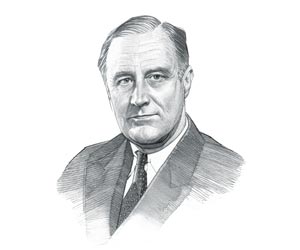|
|
|
|
|
The diverse list of FDR New Deal Programs provides an insight into the various problems that had to be addressed to counter the devastating effects of the Great Depression together with the series of droughts which had led to the Dust Bowl and the plight of American farmers. Various laws were passed which enabled the establishment of relief programs and 'alphabet soup agencies' to be established such as the AAA, CCC, PWA, TVA, SEC, FCS and the FERA. What were the New Deal Programs? The FDR New Deal Programs were established to provide immediate action, temporary measures or permanent reforms to alleviate the effects of the Great Depression. What were the New Deal Programs? The majority of the New Deal Programs are detailed in this article, a fast overview can be obtained from the opposite list. What problems did the FDR New Deal Programs address? The FDR New Deal Programs addressed:
New Deal Programs: President Franklin D. Roosevelt's New Deal
Program Facts about
FDR New Deal Programs FDR temporarily closed all banks and passed the Emergency Banking Relief Act on March 9, 1933 to address the banking crisis by regulating the banks On April 5, 1933 Congress passed the Emergency Conservation Work (ECW) Act that established the Civilian Conservation Corps (CCC). The CCC immediately provided work for 250,000 young unmarried men (18-25) in re-forestation, developing national parks and road construction. On May 18, 1933 Congress established the Tennessee Valley Authority (TVA) provided aid for the economic development in the Tennessee Valley and was one of the major New Deal programs. The role of the TVA was construct dams and power plants along the Tennessee Valley. The Tennessee Valley Authority (TVA) went on to build 20 dams to control flooding, generate hydroelectric power and increase agricultural production On June 16, 1933 Congress passed the National Industrial Recovery Act (NIRA) which was a law that authorized the President to regulate industry in an attempt to raise prices to stimulate economic recovery and established the National Recovery Administration (NRA) The National Recovery Administration (NRA) was created to stimulate competition and implementing various codes to establish fair trade. Companies who cooperated received the blue eagle "seal of approval." The Public Works Administration (PWA) was created by the NIRA awarding construction contracts for large scale public works projects such as building bridges, dams, irrigation systems, sewers, highways and airports. On May 12, 1933 the Agricultural Adjustment Act (AAA) provided immediate relief to farmers as it cut crop and livestock surplus to raise prices. It was one of the most contentious of the New Deal Programs. The Supreme Court declared that the Agricultural Adjustment Act (AAA) was unconstitutional and it was replaced with the Soil Conservation and Domestic Allotment Act on February 29, 1936) that allowed the federal government to pay farmers to reduce production so as to "conserve soil" and prevent erosion. The June 1933 Federal Deposit Insurance Corporation (FDIC) restored confidence in the banks and insured bank customers against the loss of up to $5,000 of their deposits if their bank should collapse. The May 1933 Federal Emergency Relief Administration (FERA) helped to support nearly 5 million households each month and provided literacy classes and vaccinations for millions of poverty stricken Americans. The short-lived Civil Works Administration (CWA), established by FERA in November 1933, lasted only a few months, but provided public works construction jobs for more than 4 million people. The Home Owners Loan Corporation (HOLC) was a government agency established in 1933 to help stabilize real estate that had depreciated and to refinance mortgage debt. The HOLC ceased its mortgage lending activities in June, 1936, by the terms of the Home Owners' Loan Act. The 1934 Federal Housing Administration (FHA) was created to stimulate the building industry by providing small loans for home construction. The 1934 Securities Exchange Commission (SEC) was established to protect investors from stock market fraud and deception In April 1935 the Works Progress Administration (WPA) government agency was established providing light construction jobs for millions of unskilled workers The 1935 Wagner Act created the National Labor Relations Board (NLRA) to protect the rights or organized labor and to organize and collective bargaining with employers. The 1935 Social Security Act and the Social Security Administration (SSA) was one of the most important, and expensive New Deal programs. It established a national pension fund, an unemployment insurance system, and a public assistance program for dependent mothers & the disabled people. The 1936 Rural Electrification Administration (REA) was established to supply electricity to rural communities. This Second New Deal program resulted in 98% of American farms being equipped with electric power The purpose of the 1937 Farm Security Administration (FSA) was to aid sharecroppers and set up temporary housing for Dust Bowl refugees who had migrated to California
What New Deal Programs were Unconstitutional?
What New Deal Programs are still in effect today? |
| US American History |
| 1929-1945: Depression & WW2 |
|
|
|
|
|
First Published2016-04-19 | |||
|
Updated 2018-01-01 |
Publisher
Siteseen Limited
| ||
|
|

